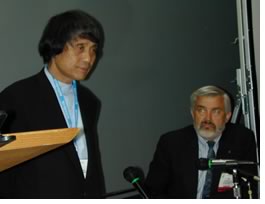
Hot from the hallowed halls of the Charlotte Convention Center, AIA eClassroom, the Institute's distance-learning provider, offers five select seminars for your continuing education pleasure. The new programs on eClassroom are:
TH08: The Hyatt Skywalk
Collapse: 20 Years Later
It has been 20 years since the Hyatt Regency's skywalks collapsed in Kansas
City. There are many false theories circulating today as to the cause.
Learn about the events leading up to the fatal collapse, the cause, and
how it changed the industry. Robert J. Berkebile, FAIA, BNIM Architects;
and G. William Quatman, FAIA, Shurgart Thomson Kilroy PC, both of Kansas
City, present the class. You'll learn:
• How the design was changed from the original "design concept"
during shop drawing review
• The opportunities to catch the design error during the review process
and thereafter
• How this tragic event changed the life of one architect
• What to watch for in contracts currently being used.
Provided by the AIA DesignBuild PIA and Victor O. Schinnerer & Company, this is a Deliver Track class.
Removing the Barriers
to High-Performance Design
Two facilities fresh on the University of Texas, Houston, campus are intended
to set new standards for education, flexibility, and resource efficiency.
We'll explore the process, teams, goals, tools, and techniques used to
overcome institutional, user-group, and design-team barriers. Moderated
by Robert J. Berkebile, FAIA, BNIM, Kansas City, the seminar offers the
views of three presenters: David C. Lake, FAIA, Lake/Flato Architects,
San Antonio; Steven A. McDowell, FAIA, BNIM Architects; and Brian Yeoman,
University of Texas Health Science Center, Houston. You will:
• Learn how to assemble and manage an interdisciplinary design team
efficiently with effective goal setting and communication tools
• Explore strategies to maximize benefits of sustainable design tools
while controlling the cost associated with large, expert teams
• Learn the costs and options for compensation associated with an
integrated, collaborative approach to high-performance design.
Provided by the AIA Committee on the Environment, this is a Services Track class.
 FR1
Gold Medalist Forum
FR1
Gold Medalist Forum
The 2002 Gold Medalist Tadao Ando, Hon. FAIA, will discuss his viewpoint
on the state of architecture, vision of the profession's future, design
methodology, and management style. Through this class, moderated by College
of Fellows Chancellor James Lawler, FAIA, you will:
• Discover the qualities, ideas, and practices needed to achieve
architectural excellence
• Gain insight into the 2002 Gold Medalist's accomplishments
• Discuss key issues of practice and design with this prominent award
winner.
Provided by the AIA College of Fellows, this is a Services Track course.
FR5 Value-Based Team
Design Decision Making
Architects are continually challenged to satisfy client-expanding expectations
within tighter or even shrinking project budgets. Value-based team design
decision-making techniques, such as value analysis, are meant to assist
the architect within the context of doing more for less, whether enhancing
building performance, achieving a strong design image, lowering life-cycle
costs, or optimizing environmental sustainability. Moderated by Richard
Hobbs, FAIA, strategic advisor, Roche Harbor, Wash., the seminar has two
presenters: Stephen J. Kirk, PhD, FAIA, Kirk Associates, Grosse Point
Park, Mich., and Richard G. Turk, National Park Service, Denver.
You'll learn to:
• Facilitate value-based team design workshops
• Improve communication between the client and design disciplines
using value-analysis tools
• Integrate design decisions using a value-based multidiscipline
team workshop approach.
Provided by the moderator and two presenters, this is a Client Track course.
SA25: Architect Liability
under ADA and Other Federal and State Laws for Accessibility
More than ever before, the architect's focus is on accessibility under
federal and state laws and codes. This common-sense approach to managing
risk and improving client service will provide a better understanding
of architect responsibility and liability under these requirements. The
seminar's two presenters are Eric C. Rowe, Greenberg Traurig LLP, Washington,
D.C., and Soy L. Williams, AIA, Greenberg Traurig Consulting Inc., Miami.
You'll learn about:
• The tools to identify properly and resolve the differences between
federal disability-rights access laws and relevant state requirements
• The impact of noncompliance on architectural practice
• The significant differences between state and federal requirements.
Provided by Greenberg Traurig, this is a Deliver Track class.
If you haven't taken an AIA eClassroom course yet,
you should know that signing up for one is fast and easy. You simply:
• Enroll through the secure e-commerce capabilities of AIA eClassroom.
AIA Members pay $49.95 per learning unit; non-AIA members pay $74.95.
• View the program and supplemental learning materials, then take
the quiz.
• LU hours will be recorded for AIA members at the University of
Oklahoma, keeper of the AIA's Continuing Education System records. Just
provide a valid AIA member number when you register. Nonmembers may request
a certificate of completion.
AIA eClassroom offers a wide variety of programs. Check it out: eclassroom.aia.org.
Copyright 2002 The American Institute of Architects. All rights reserved.
![]()
|
Each of these five courses offers 2 learning units and meets the AIA/CES criteria for Health, Safety, and Welfare (HSW). For a complete list of AIA eClassroom programs, go to eclassroom.aia.org. CES Reminder: The following states have a June 30 reporting date for continuing education credits: Iowa, Kansas, Kentucky, Minnesota, Oklahoma, Oregon, and West Virginia. July 31 is the reporting date for Arkansas, New Jersey, and Texas. To read about the Gold Medalist Forum, click here. AIA eClassroom offers distance learning programs carrying health, safety, welfare credits on a variety of subjects, from "Security Design with Crime Prevention Through Environmental Design" to "Accessibility Through Historic Integrity." And your credits are automatically registered if you provide your AIA membership number. For the complete list of eClassroom offerings, visit eClassroom. |
|